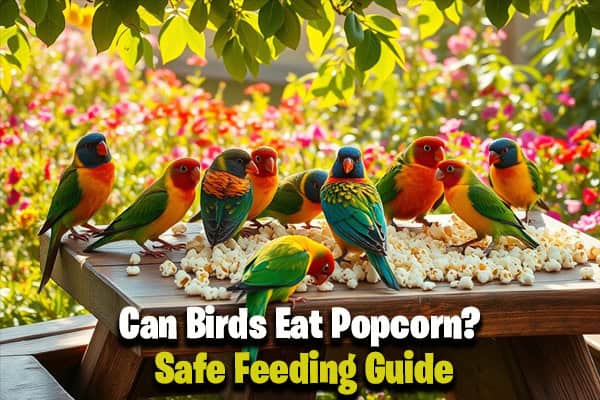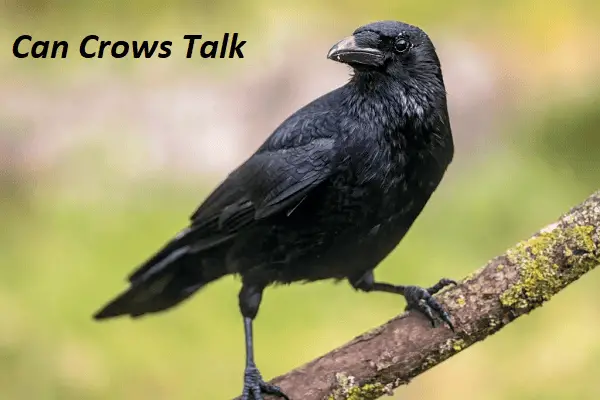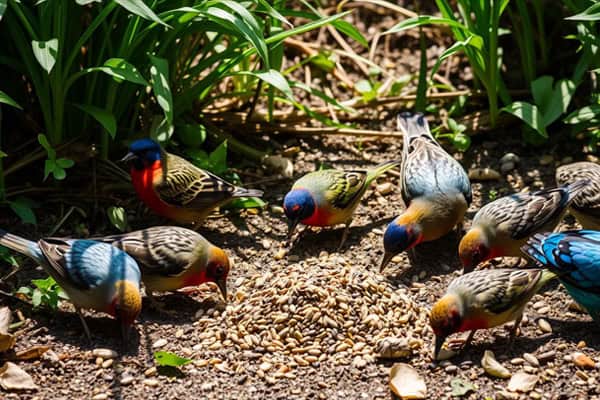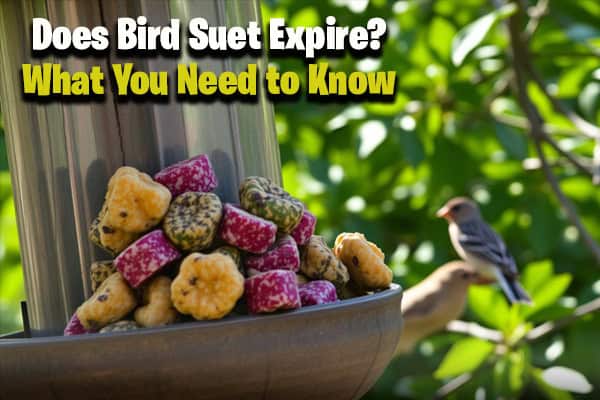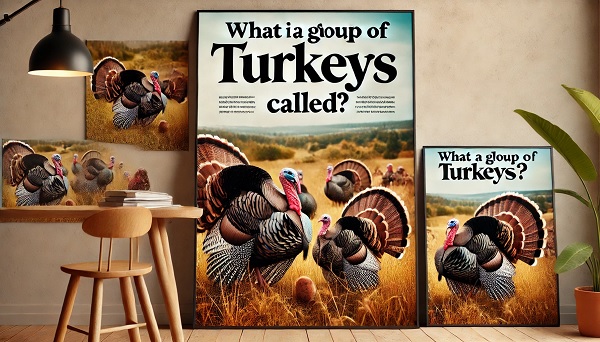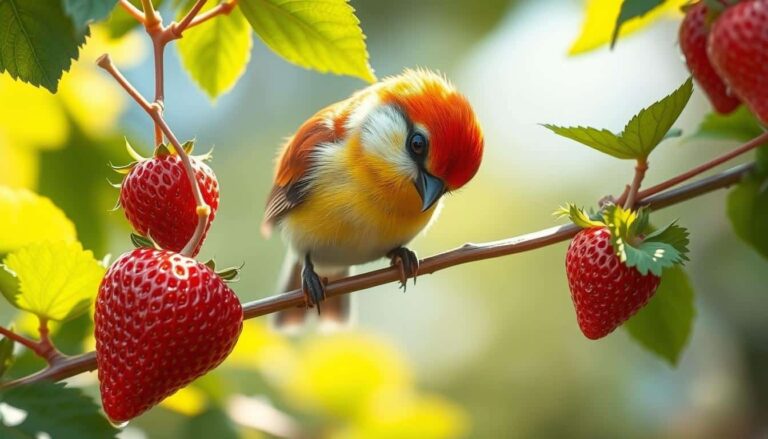Can Birds Eat Popcorn? Safe Feeding Guide
Can Birds Eat Popcorn? Ever thought if birds could enjoy popcorn like we do? It’s key to know what birds can eat safely. We’ll look into whether birds can have popcorn, its safety, and nutrition. It’s vital to pick treats that fit their special bird diet needs.
We’ll find out which popcorn is safe and how to share it with birds. Remember, popcorn is a fun treat but not a main food for birds.
Understanding Birds’ Diets
Knowing what birds eat is key to their health. A good bird diet has proteins, fats, vitamins, and minerals. These help birds stay healthy and behave well. Watching what birds eat helps us feed them better in our backyards.
The Importance of a Balanced Diet
A balanced diet is vital for birds. It affects their feathers and energy. We need to offer a variety of foods to support their nutrition. Without variety, birds might not get all the nutrients they need.
Common Foods for Backyard Birds
Backyard birds love seeds, fruits, and insects. These foods make our yards lively. Here are some favourites:
- Sunflower seeds
- Finely cracked corn
- Fruit like apples and berries
- Suet cakes
- Mealworms
Bird Feeding Habits and Preferences
Birds have different eating habits. Some like to find food on their own, while others prefer what we offer. They are curious about our food. We can choose what to feed them based on what they like.
| Type of Food | Common Species | Nutritional Benefits |
|---|---|---|
| Seeds | Chickadees, Finches | High in fats and proteins |
| Fruits | Cardinals, Blue Jays | Rich in vitamins and hydration |
| Insects | Caterpillars, Mealworms | High in protein, essential for growth |
| Suet | Woodpeckers, Nuthatches | Energy-rich source for winter |
Can Birds Eat Popcorn?
It’s important to know if we can give popcorn to our bird friends. We need to check if it’s safe and good for them. We want to make sure it helps keep them healthy.
Safety and Nutritional Considerations
Birds can react differently to popcorn, depending on how it’s made. Plain, air-popped popcorn is usually okay for them. But, we should avoid popcorn with salt, butter, or other additives.
Too much salt can harm their kidneys and cause dehydration. It can even be deadly. Also, fats from butter and oils can cause liver disease and obesity in birds.
We should also watch out for preservatives and artificial flavors. They can be toxic and cause stomach problems and allergies. Birds can’t handle a lot of sugar, which can lead to obesity and other health issues. Sweeteners like xylitol are especially dangerous, even in small amounts. Spices like garlic and onion can also be harmful, causing anemia.
Types of Popcorn Safe for Birds
When thinking about popcorn for birds, we also need to consider unpopped kernels. While big birds might be okay, small birds should have soaked kernels to help with digestion. Hard kernels can be a choking hazard, so we must be careful.
It’s better to give them safe foods like seeds, suet, or fresh fruits. Birds like to eat what they can find, so knowing what they like helps us feed them right. Our main goal is to give them healthy food that keeps them well.
| Preparation Type | Bird Suitability | Health Risks |
|---|---|---|
| Plain, Air-Popped | Safe | Low risk if offered occasionally |
| Butter/Flavored | Not Recommended | Fatty liver disease, obesity |
| Unpopped Kernels | Large birds | Choking hazard |
| Mixed with Salt | Not Recommended | Dehydration, kidney dysfunction |
| Sweetened Versions | Not Recommended | Toxicity risk, metabolic disorders |
Nutritional Value of Popcorn for Birds
Can Eat Popcorn is a good snack for birds, but it’s not a complete meal. It’s best when given in small amounts as part of a balanced diet.
Benefits of Fiber in Bird Diets
Fiber is key for a bird’s digestive health. Popcorn adds to this, helping prevent constipation and obesity. More fiber means healthier birds.
Popcorn’s Role in Providing Carbohydrates
Carbohydrates give birds energy. Popcorn is a good source of carbs. It adds variety to their diet, but shouldn’t be the main food.
Feeding popcorn twice a week can be good if it’s plain and unsalted. Avoid flavoured or microwaved popcorn because of unhealthy fats and salts. Using a popcorn machine is a safe way to give popcorn to birds. You can also use an air popper or popcorn in a brown paper bag for healthier options.
| Feeding Method | Benefits | Considerations |
|---|---|---|
| Unflavored Popcorn | Healthy fiber and carbohydrates | Avoid excessive intake |
| Regularly Popped | Energy source | Limit to a few times a week |
| Microwave in a Bag | Quick preparation | Ensure no added oils/salts |
| Air Popper | No added fat or salt | Use appropriate kernels |
Popcorn can be a good addition to a bird’s diet, but it’s not enough on its own. It should be part of a variety of nutritious foods. This makes for healthier and happier birds.
How to Properly Feed Popcorn to Birds
Feeding popcorn to birds can be fun for both us and the birds. We need to prepare popcorn in a way that keeps birds healthy. It’s important to follow the right steps to avoid any harm.
Knowing how often to give popcorn is key to keeping their diet balanced. This helps ensure they get the nutrients they need.
Preparation and Serving Guidelines
Use plain, air-popped popcorn for birds. This avoids salt, butter, and other unhealthy extras. Air-popping ⅓ cup of corn kernels is a simple and safe way to prepare it.
Let the popcorn cool down completely before giving it to the birds. Hot kernels can hurt them.
Give popcorn in small amounts. Smaller birds might choke on hard kernels. Always choose popped popcorn for their safety.
Recommended Frequency for Feeding
Don’t feed popcorn too often. It’s better as an occasional treat, not a main part of their diet. Too much can upset their nutrition.
Offer popcorn 1-2 times a week, in small amounts. This keeps their diet balanced. Also, mix in other healthy treats to add variety.
By carefully preparing and serving popcorn, we can enjoy sharing it with our bird friends. This way, we ensure their diet stays healthy and balanced.
| Treat | Recommended Frequency | Notes |
|---|---|---|
| Plain Air-Popped Popcorn | 1-2 times per week | No salt or butter; keep portions small. |
| Seeds and Nuts | Daily | Healthy staples for birds; varied options recommended. |
| Fruits and Vegetables | 3-4 times per week | Fresh and safe options increase dietary variety. |
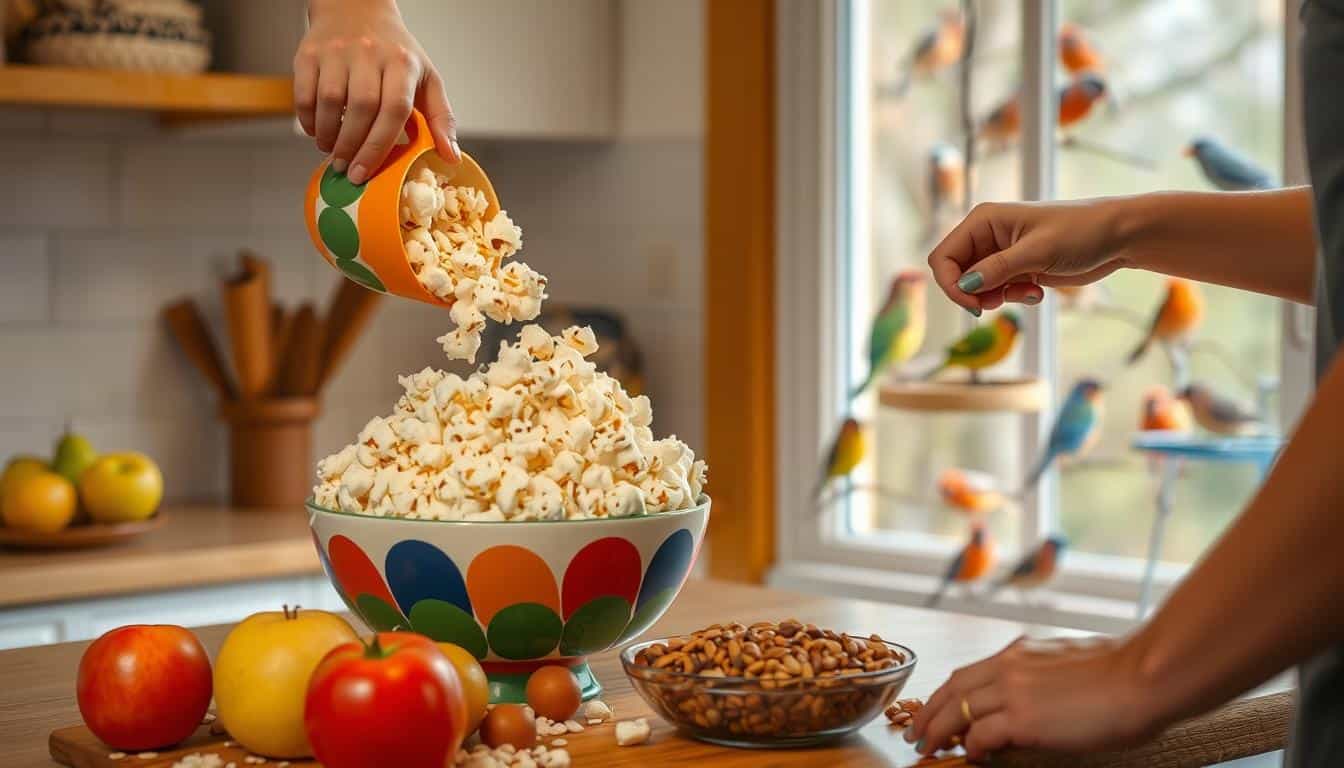
Birds That Enjoy Eating Popcorn
Popcorn is a tasty snack for many bird species. It adds variety to their diet in a fun way. We need to think about the size of the birds when giving them popcorn.
Common Birds That Will Eat Popcorn
Some birds love popcorn, including:
- Blue Jays
- House Sparrows
- American Robins
- Crows
- Woodpeckers
These birds like both popped and unpopped kernels. It’s key to give popcorn without salt to keep them healthy. We should only give popcorn as 10% of their daily food to prevent stomach problems.
Considerations for Small vs. Large Birds
Size matters when giving popcorn to birds. Smaller birds like finches and parakeets prefer fewer kernels. Larger birds, like cockatoos and macaws, can eat more.
For small birds, softening kernels or giving them smaller pieces helps. It’s also important to give them natural foods like seeds and fruits. We can make popcorn balls with natural ingredients, where popcorn is just a small part.
| Bird Size | Examples | Popcorn Consumption |
|---|---|---|
| Small | Finches, Parakeets | A few kernels |
| Large | Cockatoos, Macaws | More kernels |
By thinking about these things, we can make snack time fun and safe for our bird friends who love popcorn.
Conclusion
Can Birds Eat Popcorn? Offering popcorn to birds can be a fun treat if done right. It gives them fiber and carbs for energy. But, it’s key to remember it’s not a full meal.
Popcorn should not be the main food for birds. It lacks protein and important vitamins. We need to be careful with how we give it to them.
Make sure the popcorn is plain and air-popped. Avoid adding salt or oil. It’s best to give it out only once or twice a week.
By mixing popcorn with other foods like seeds and fruits, we help the birds. This way, we make sure they get all they need. Following this guide helps keep the birds healthy and happy.
As nature lovers, we must make sure birds get the right food. Watching their diet, especially if they have health problems, keeps them lively. Let’s keep learning about bird nutrition to give them the best diet.

